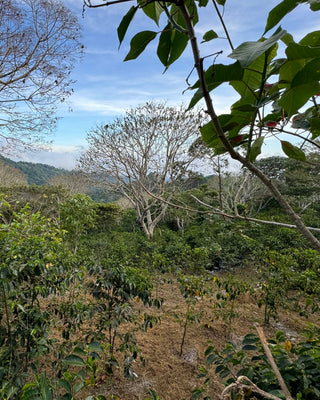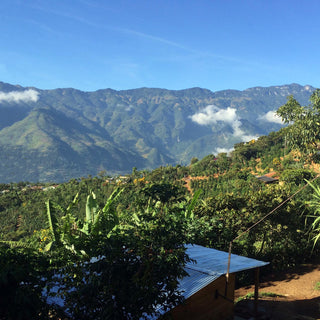- Filter
Aliss Hartmann Yellow Maragogype Natural
PAPAYA | CANTALOUPE | TAMARIND
This is another gem from Aliss’ Finca Momoto. We have usually brought in her Geisha, but this time we’re roasting her Maragogype natural. It’s big, tropical, silky and sweet; what’s not to like?!
This omniroast has been optimized for filter, but a well trained barista will definitely be able to pull tasty shots with it.
Adding product to your cart

LOVE AT FIRST SIGHT… SLURP
Finca Momoto is a farm owned by Aliss Hartmann. She is the only daughter of the late Chicho Hartmann, and her story is one of perseverance and sheer toughness. Being the only daughter in a family of four brothers must have had its challenges, but it made Aliss tough. Over two decades ago, Aliss and her husband moved to the US to raise her two kids, Giuliana and Giuseppe. After the marriage ended, she moved back to the farm and continued to raise them as a single mother.
During this time, she played a key role in managing the Hartmann family farm. Not an easy task, in a male-dominated field. Then in 2015, she decided to start her own farm, Finca Momoto. She started it primarily to share the love of coffee with her children. She grew up around coffee trees and wanted her children to develop the same love for nature that her dad once showed her.
Although getting Momoto off the ground was a monumental challenge, Aliss’ toughness and her kids’ help pulled them through the hard times and now the farm is producing some amazing coffees. The farm sits in a pretty pocket, nestled in a large native forest. This forest is one of the keys to the magic of her coffees.
The coffee is a natural processed yellow maragogype that instantly impressed me on the cupping table. It’s juicy, tropical, sweet and super velvety. I loved this coffee from the moment I first laid eyes on it, or should I say, the first time I slurped it on the cupping table?
One of the coolest things about this coffee is how it was dried. Back in 2014, Ratibor had become convinced that the best and only way to dry natural processed coffees was to gently dehydrate the coffee, rather than to dry it out in the sun or in mechanical dryers. So, after several experiments, Ratibor built a dehydrating chamber in a room just outside his house and did some testing on specific lots in 2017. He further refined the process in 2018 and 2019, and in 2020, he made his experimental chamber a permanent fixture for his coffees. In 2022, he helped the family build a larger dehydrating chamber for the Hartmann coffees. This chamber kept the humidity below 50%, the temperature around 30C and the air moving quickly. When I taste naturals dried this way, I am always so impressed by how clean, tasty, and consistent they are. It is a beautiful and true representation of the maragogype profile.
– Sebastian


